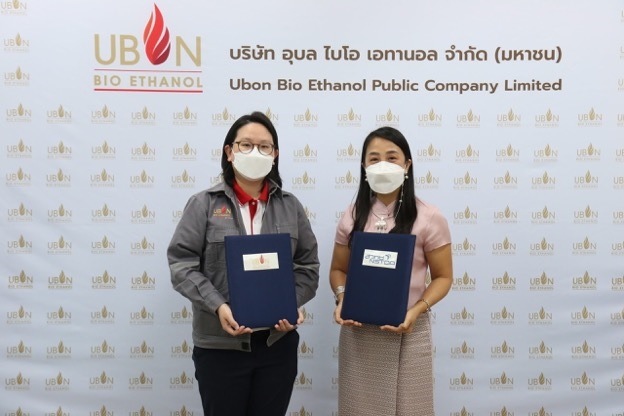NSTDA and Ubon Bio Ethanol Public Company Limited (UBE) recently signed an agreement to promote organic cassava production in four provinces in northeastern Thailand, namely Ubon Ratchathani, Yasothon, Sisaket and Amnat Charoen. Representing each party at the signing event were UBE Managing Director Ms. Sureeyot Khowsurat and NSTDA Executive Vice President Ms. Viraporn Mongkolchaisit.

Cassava is one of Thailand’s main cash crops, contributing billions of Thai baht to the economy. The country is one of top cassava products exporters in the world. For this reason, NSTDA R&D program focuses on technology and innovation for cassava production and downstream industry. A number of innovations have been developed including new cultivars, production of disease-free cassava cuttings, biocontrol products, diagnosis tests and cassava flour production technology.
NSTDA in collaboration with the Department of Agriculture and Land Development Department launched a project to transfer knowledge and technology to cassava growers in enhance cassava productivity and quality. In addition, a demand-led production has been introduced by connecting growers to buyers. NSTDA worked with UBE applying this model to a group of organic cassava growers in Yasothon, resulting in improved cassava quality meeting the factory’s high starch content requirement. In 2021, the productivity rose from 3.3 tons/rai (20.63 tons/ha) to 3.6 tons/rai (22.5 tons/ha). Though the production did not increase significantly, farmers earned much more profits because of lower production costs and higher price thanks to better quality. The project made THB 1.3 million economic impact. This public-private partnership model benefits not only cassava growers, but also cassava processing factories as they are supplied with better quality materials.
In this NSTDA-UBE collaboration, the model will be implemented in Ubon Ratchathani, Yasothon, Sisaket and Amnat Charoen to enable cassava farmers in these four provinces to improve the productivity and quality and meet the domestic and international standards for organic agriculture. UBE requires cassava roots that are non-GMO, have high fiber content and medium to low glycemic index for its food processing industry to meet the demand of North America and Europe.
